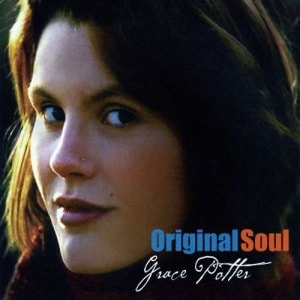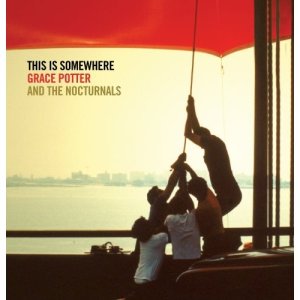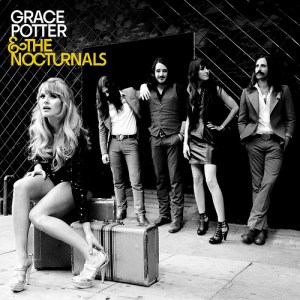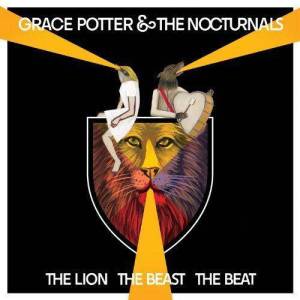Getting To Know Grace Potter (Interview)
With Joss Stone, India.Arie, Steve Earle, John Mayer, The Doobie Brothers and Elvis Costello all playing in Auckland this past weekend, it was a busy time for any dedicated music lover. One of the unexpected highlights of the weekend was Grace Potter & The Nocturnals’ blistering opening set for John Mayer at the Vector Arena on Saturday night. Although they are relatively unknown in New Zealand, Grace Potter & The Nocturnals have been staples of the US live scene for over a decade, with five studio albums to their credit. On Saturday night, Potter proved what a terrific musician and performer she is, singing soulful, gospel-influenced ballads one minute and rocking out to some serious blues-rock the next. Not only can she sing, but she plays keyboards and guitar like a 1970’s rock God. The 13th Floor’s Marty Duda met up with Grace Potter a few hours before she was due to take the stage at the Vector and asked her to give a little overview to her career for Kiwis who may just now be aware of Grace Potter & The Nocturnals.
Click here to listen to the interview:
Or read a transcription of the interview with Grace Potter here:
MD: I know it’s been several years since your album, most recent album came out. Are you at the point where you’re working on new material or are you..
GP: Yeah we are so, we just started though. So the band hasn’t…we’ve been taking some time off because our last tour was two full years of grind um and we decided that after October of 2013 we were just gonna take the first break The Nocturals have ever taken in the entire eleven years that we’ve been together. By break that, usually when we say break we mean three days off and then back on the road, I mean the longest amount of time we’ve ever taken off consecutively was one month. And so this has been almost eight months off which is unbelievable for us, it’s a real accomplishment, it took a lot of restrain not to keep booking shows and doing things, but um and cause we all love playing together so much, but I think it was important for us all to enjoy the houses that we pay rent for. Or the apartments you know, so um we just got back together a week before we came to Australia and I had a boat load of new songs and the guys brought in some ideas as well, and we wrote a few things just from scratch together and that was just a real flood of inspiration so the songs are taking shape in a big way.
MD: So since this is the first time you’ve been in New Zealand, performing especially, I was hoping to kinda do a little kind of career overview with you.
GP: Sure. Let people know what’s going on.
MD: Yeah cause you have a body of work, um the first album came out 2004 so maybe we can just like pick a song from each album that you can talk about that you think is representative. Starting with the first one and work towards, can you think of something at the top of your head for the first one?
 GP: From the first record which is actually just a self-titled album that we put out, it’s called It’s Grace Potter without the band even though it had all the members of the band and the record was called Original Soul and theres a song from that record called Deliverance Road that I wrote. And it was in that phase especially in the early days where I really was in this old soul…I like to write stories, almost autobiographical but not about me now, about me if I was like 80. I really liked sort of projecting to what, what I might feel like as an old person who has lived a life of you know, either redemption or demolition. Depending on which way it goes, I like sort of looking at that hypothetically. And sonically you know, we were very quiet, we were very soulful, um which we still are, the pallet was um smoother, softer, almost I hate to say dinner music but that’s basically what we were doing and it was at that era of, I’m not sure if you remember but there was a lot of that soft sound and Diana Krall and Norah Jones were doing a lot of really beautiful sultry singing and um you know, that’s where I started and then the amps slowly got turned up. So the next record, this is somewhere, actually Nothing But the Water sorry was another self-produced album. That was the first full band that was Grace Potter and the Nocturnals um and that was in 2005 that we put that out and the song I’ll talk about from that is the title track Nothing But the Water, it’s a two part epic, um again it’s sort of plays with the themes of redemption, but I tap into that gospel influence that really hit me at an early age, I was always really drawn to church music but not Northern Protestant church music, I’m talking about Southern Baptist church music and with soul and spirit and I was listening to a lot of Al Green and at that point he had just become you know, Reverend Al Green. So um I think that was definitely a movement in a new direction certainly tempo-vise, it really picked up. And then we move onto This Is Somewhere, a record that was our first major label project, we’ve never been in a real studio before, we recorded all our other work in barns and garages for the most part in Vermont. So This Is Somewhere, we found ourselves in sunny California in a fancy studio with people like squeezing orange juice for us, it was very strange, it was a weird feeling um, and one of the things I’m really proud of from that record was that we maintained our sense of self through some serious adversity and confusion and misunderstanding sort of what it means to be on a major label and all of a sudden there are all these people with all these opinions showing up.
GP: From the first record which is actually just a self-titled album that we put out, it’s called It’s Grace Potter without the band even though it had all the members of the band and the record was called Original Soul and theres a song from that record called Deliverance Road that I wrote. And it was in that phase especially in the early days where I really was in this old soul…I like to write stories, almost autobiographical but not about me now, about me if I was like 80. I really liked sort of projecting to what, what I might feel like as an old person who has lived a life of you know, either redemption or demolition. Depending on which way it goes, I like sort of looking at that hypothetically. And sonically you know, we were very quiet, we were very soulful, um which we still are, the pallet was um smoother, softer, almost I hate to say dinner music but that’s basically what we were doing and it was at that era of, I’m not sure if you remember but there was a lot of that soft sound and Diana Krall and Norah Jones were doing a lot of really beautiful sultry singing and um you know, that’s where I started and then the amps slowly got turned up. So the next record, this is somewhere, actually Nothing But the Water sorry was another self-produced album. That was the first full band that was Grace Potter and the Nocturnals um and that was in 2005 that we put that out and the song I’ll talk about from that is the title track Nothing But the Water, it’s a two part epic, um again it’s sort of plays with the themes of redemption, but I tap into that gospel influence that really hit me at an early age, I was always really drawn to church music but not Northern Protestant church music, I’m talking about Southern Baptist church music and with soul and spirit and I was listening to a lot of Al Green and at that point he had just become you know, Reverend Al Green. So um I think that was definitely a movement in a new direction certainly tempo-vise, it really picked up. And then we move onto This Is Somewhere, a record that was our first major label project, we’ve never been in a real studio before, we recorded all our other work in barns and garages for the most part in Vermont. So This Is Somewhere, we found ourselves in sunny California in a fancy studio with people like squeezing orange juice for us, it was very strange, it was a weird feeling um, and one of the things I’m really proud of from that record was that we maintained our sense of self through some serious adversity and confusion and misunderstanding sort of what it means to be on a major label and all of a sudden there are all these people with all these opinions showing up.
MD: Well I think I read somewhere that you said that they kind of wanted you to be Norah Jones and you wanted to be Robert Plant.
GP: Exactly.
 MD: So that’s a pretty big chasm to fill in, how did that…
MD: So that’s a pretty big chasm to fill in, how did that…
GP: Well you can hear that on that record, you can hear the push and pull and you can hear the band also really sonically coming and gelling together and figuring out that we as musicians, we are so dynamic, it’s very hard, it’s almost like in an album you have to choose one or the other because on stage you can show a full spectrum of what you do but on an album you wanna be able to listen to it all that way through and not press skip on any of the tracks. So that record was really about finding a consistent sound and an atmosphere and a sonic landscape that we could all agree upon, which you know, there were a lot of cooks in the kitchen, first time we’d ever worked with a producer, um very, very strange time but also really beneficial for us.
MD: And how about the band itself when you’re going through that. Did it kind of bring you guys together, did you all agree about what you wanted as a band?
GP: Well I think we teamed up you know, it was sort of us against them and which is not a good way to look at the world or a record company because really they were trying to help and um we being from a do it yourself, you know we had been a band for almost five years at that point, we already kinda knew our trajectory and what we wanted and how easy it had been to make records up until that point and then all of a sudden it was like someone had thrown, you know a wall up in front of us that we felt like we were climbing over all the time, when in fact that’s just how the industry works and there are gonna be other opinions and there are gonna be test audiences that like listen to your song and tell you whether they will listen to it on the radio or not. I mean it was just crazy to us at the time but um of course we’ve come to understand that that’s just part of the…
MD: Well I’ve just talked several, two other artists recently Tift Merritt who was here and India Arie and both of them.
GP: Ah Tift.
MD: Both of them took time off.
GP: Yeah.
MD: Ah like three or four years because of the pressure and the stress from dealing mostly with the record label rather than anything else so.

GP: Yeah and it doesn’t have to be that way. I think one of the great things about what we’ve had as a band is the opportunity to, you know, find our identity through who is willing to take those roles on, who is willing to accept things and who isn’t. The getting along together part of the band is the stressful part, it’s not so much if you have us against them, it’s like they’re the bad guys no problem. What’s interesting is when a band feel differently and as we grew up, yes of course we were all on the same team, but as we grew up and started getting into the industry more we did realise we all had slightly different goals and um that’s actually when some of our membership started changing and you know the ever rotating bass player, that’s where that myth began was really because our bass player really didn’t, he was not into it and I can’t speak for him that that was the only thing but it certainly was um it was a big reality check and there was a lot of growing up that we all needed to do before we could make sense of it. So that really was another turning point and then that launched us into the eponymous record.
MD: So going to a major label, was it worth it. Did you get the audience that you were after?
GP: Well yes and no because they signed us knowing that we were an anomaly. We are partly to do with Disney Music Group and Hollywood Records is Disney Music Group and um we were the crazy band from Vermont. They knew that we were a do it yourself and they knew that we wanted to maintain that style of doing things and really focusing on touring. So theres a lot of good energy put towards making sure, they were very respectful and intentionally said like okay we’re gonna put this out but we understand your comfort zone and we’re not gonna push you further than you wanna go, when you’re ready to go all the way there, you’re on the right record label for us to be able to launch it all the way but you guys need to be ready and they were very clear about that and it was one of the best pieces of advice we ever got was like there’s no rush you know, figure out who you wanna be and what you wanna sound like, when you’re ready to pull the trigger, we are the gun for you. And we’re still with them.
MD: Yeah, so what kind of discussion did you guys have and what have you decided?
 GP: So I had a discussion with myself really, I had to reason with myself a little bit about what my goals were and I did come to discover two things. I wanted much more success than some people were comfortable with and I wanted less success than what I saw happening to the music industry sonically. There were some you know, especially female artists there was just so much bad music and I was like I need, I want to come in and make music that is gonna resonate and not just now, not just next week, not just in a year where everyone goes ‘remember that hit she had’ but forever. And that was where the real battle began, and that’s where you know, really I had never tried to write a pop song before and the day I wrote Paris (Ooh La La) whichwas the opening track for our eponymous record Grace Potter and the Nocturnals I knew, I was like this is what I’m talking about when I said okay this is a cross over song, this is a song that everybody wants to sing-a-long to. I never thought we would be the kind of band to have a song like this but I wanna take it all the way there. I wanna dress like a real, I wanna put on a Tina Turner sparkle dress, I wanna kick my shoes off and dance like a mad woman, I wanna play the guitar, I wanna flip my hair, I wanna do all the things that I was never comfortable doing before because I am 25 and my body’s only gonna look this for so long and all of a sudden I really broke out of my shell as a lead, as a front person. So that was a huge transition and one that I’m really proud of, one that was very difficult and hard to understand for a lot of our earlier fans and for some people in our inner circle who just weren’t comfortable seeing me all of a sudden taking on that role in a very confident way.
GP: So I had a discussion with myself really, I had to reason with myself a little bit about what my goals were and I did come to discover two things. I wanted much more success than some people were comfortable with and I wanted less success than what I saw happening to the music industry sonically. There were some you know, especially female artists there was just so much bad music and I was like I need, I want to come in and make music that is gonna resonate and not just now, not just next week, not just in a year where everyone goes ‘remember that hit she had’ but forever. And that was where the real battle began, and that’s where you know, really I had never tried to write a pop song before and the day I wrote Paris (Ooh La La) whichwas the opening track for our eponymous record Grace Potter and the Nocturnals I knew, I was like this is what I’m talking about when I said okay this is a cross over song, this is a song that everybody wants to sing-a-long to. I never thought we would be the kind of band to have a song like this but I wanna take it all the way there. I wanna dress like a real, I wanna put on a Tina Turner sparkle dress, I wanna kick my shoes off and dance like a mad woman, I wanna play the guitar, I wanna flip my hair, I wanna do all the things that I was never comfortable doing before because I am 25 and my body’s only gonna look this for so long and all of a sudden I really broke out of my shell as a lead, as a front person. So that was a huge transition and one that I’m really proud of, one that was very difficult and hard to understand for a lot of our earlier fans and for some people in our inner circle who just weren’t comfortable seeing me all of a sudden taking on that role in a very confident way.
MD: And you also had a couple of interesting producers on the album, Dan Auerbach and Jim Scott, so what did they bring to the mix?
GP: They really cared about the sounds, they cared more than anybody’s ever cared before about what the record should sound like and for me the process was harder because there was no definitive producer. I was also a co-producer, Dan, Jim, the band had lots of ideas themselves. We all were striving for the very best, um but I’ve never, you know people have taken care to make things sound perfect before, you know like this is exactly how the drum has to sound, spending four and a half hours like mic-ing the drum kit, that happened but this time around, it was vibe, there was atmosphere um so what we’re talking about is The Lion the Beast and the Beat that’s the record we just put out in 2012 um and I would say that again the song that really stands the test of time for me would again be the title track The Lion the Beast and the Beatbecause the spirit of it in its two parts, starting sort of dark and almost you know, atmospheric ballad and then all of a sudden bursting wide open into this you know, raging rock song um, was another big breakthrough for us in terms of sonic daredevil behaviour.
 MD: So how did your long term fans react to kind of the new Grace Potter?
MD: So how did your long term fans react to kind of the new Grace Potter?
GP: I mean it was an interesting, it was a mixed review, I think that there was a lot of people that were go relieved that we didn’t crumble under the pressure of the whole thing. You know, a lot of fans were just happy to know that we were still there and that we’re still a band and that at the heart of it, Matt, myself and Scott Tournett has always been the core members and that the membership wasn’t changing. I wasn’t going all quote unquote “Gwen Stephanie” as everybody was worried I was gonna do for a long time you know, um which you know solo careers and solo projects from Tom Petty to Wilco to um you know, Robert Plant, you look at all artists who do you know, wonder off on their own and it’s usually really at a time when they’re ready to. I still just don’t feel like I’ve ever been ready to so for our fans it was just so exciting to see the band firing all pistons and getting stronger and stronger and stronger with every single record.
MD: So you’re at the point where, like you said you’ve got a new batch of songs, do you see any kinda particular direction, or do you have thoughts about what you want it to sound like?
GP: I think um, well we went out into the desert for the writing of a lot of these songs and it started in the desert here actually, in Australia we were, it was a year ago I started writing lyrics and we took the trip from Perth to Bryon Bay and there was this sort of unbelievable sense of perfect stagness to what a desert feels like. This beautiful wall of silence that is also the thing that makes an album, it’s a noise floor and the desert, I don’t know whether its wind or the absence of any sound at all but there’s something really crisp and clean and dry and perfect about it. So on the new record there’s gonna be that slightly psychedelic atmospheric sense of um, simplicity, it’s not gonna be quite so dripping with ideas, I think we’re gonna boil it down to the very best ideas.
Watch the video for Paris (Ooh La La) here:[youtube http://www.youtube.com/watch?v=oHlhOgQ36m8]
- Challengers – Dir: Luca Guadagnino (Film Review) - April 24, 2024
- Civil War – Dir: Alex Garland (Film Review) - April 9, 2024
- Pearl Jam – Dark Matter (Monkeywrench/Republic) Album Review - April 1, 2024
